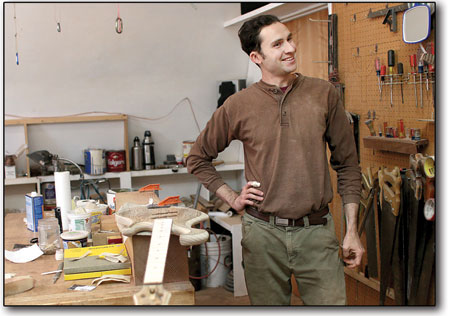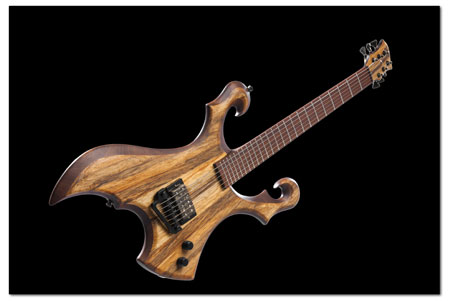

Custom bass guitar maker and owner of Xylem Handmade Basses and Guitars, Anthony Olinger, talks about his craft in his shop off County Road 203 last Thursday. The Durango native started making instruments out of college in 2006 and now is in high demand around the world, with a two-year waitlist./Photo by Jennaye Derge
Slow hand
Durangoan takes the long way in crafting high-end instruments
by Ted Holteen
It’s been said that it’s never too late in life for a career change. Durango’s Anthony Olinger proves that it’s never too early, either.
In 2006, Olinger was just completing his degree in zoology at Colorado State University when, like many 22-year olds, he got distracted. But unlike some of us at that age whose distractions led to countless Grateful Dead tours and employment by Jamaican drug dealers, Olinger’s folly guided him to a different but much more successful career path.
“I made my first bass two weeks before I graduated and kind of changed my mind about what I was going to do,” Olinger said recently at his family’s Animas Valley Quonset hut-turned-woodshop.
The idea of going into the business of making musical instruments was even more unlikely because at the time Olinger had been playing bass for less than four years. He’s now 31, and his company, Xylem, is becoming a major player in the industry. Unlike the bands to which he caters, Xylem – which is derived from the Greek word for “wood” – is a one-man show. Olinger makes three instruments at a time, and his current pace is about nine to 12 per year. In this case, supply and demand is on the side of the craftsman, as he’s got a two-year waiting list for his products. One of those waiting patiently is local guitarist Russ Crossland, with whom Olinger played in Diabolical Sound Platoon until he got too busy and had to leave the band in 2011. Crossland’s was not one of the three on which Olinger was working last week, but he said it’s next.
“He ordered his in 2013, so yeah, I’m a little behind,” Olinger said.
Xylem guitars and basses put Olinger in that rarefied circle of creators who are true artisans, not just producers. He wrangles fine (see also: expensive, rare) woods from sources near and far, including ebony, bloodwood, mahogany, black walnut and korina and other words that end in vowels. He makes regular trips to the Front Range to wood dealers, often gets lucky at the Habitat for Humanity store, and he’s also got an ace-in-the-hole for some of the harder-to-get woods.
“I order it from an Indian guy in New Jersey,” Olinger said, adding for all of our benefit, “he’s been the main guy since the ’80s that Gibson bought their wood from.”
Each instrument is assembled from scratch, and the sanding alone for each is a two-day process. Olinger said it’s not just the fancy good looks that draw professional musicians to his instruments; they actually make life onstage easier. His basses weigh between 6 and 7 pounds; by comparison the iconic Les Paul Gibson guitar can weigh between 8 and 11 pounds, and most electric basses weigh even more than that. One of his endorsing musicians is Chicago bandleader, session artist and instructor, Jauqo III-X. Jauqo received his first Xylem bass in 2014.
“I’ve played a few of Anthony’s basses, and they all seemed to play very well and the attention to quality was a sure indicator that he was really about building a superior instrument that he could be proud of,” Jauqo said. “The bass overall is a blast to play, and it played extremely well right out of the box, and that said a lot about the quality. It’s a strong indicator as to how much better it would play after it’s set up more to personal preference.”
 Olinger is a bassist but he also builds guitars like “Myraxis,” which is owned by Matt Schorsch./Photo by Diane Zahorodny, courtesy Anthony Olinger |
Olinger spent some time in Chicago after graduating from CSU and that’s where he built his first three instruments for sale – again in the kitchen of an apartment. Since his return to Durango, he’s kept those Windy City ties and through Jauqo’s connections, he now sells his
basses and guitars at the renowned Chicago Music Exchange. At least he would if he could keep up with demand; his last instrument sold out in September and he’s still playing inventory catch-up. Despite the demand, Olinger said higher production rates aren’t coming anytime soon.
“I like having all the control to myself,” he said. “A lot of people are telling me I need an apprentice and employees, and I’ve seen a lot of guys in my field get that and the quality of their work instantly goes down and it gets around quickly and your reputation suffers. Everything I do is fully custom, which gives me a huge edge over my competition.”
It’s also about attention to detail and perfection, or as close to it as is reasonably possible. The joints of his instruments are flat to within a thousandth of an inch, making the basses and guitars low action, which is much easier to play. “That’s what separates you from the $200 instruments,” Olinger said.
Just how much separation is there between those instruments and Olinger’s? His instruments start at $1,800, but he hasn’t made one in that price range in quite some time. The six-and four-string basses he’s currently working on will sell for $4,000 each, and it can go up from there depending on materials. And ironically, his methodical production method often tends to benefit the bottom line as well.
“With the wait time people get more money and decide they want to do more and more stuff, like go from a four-string to a seven-string with inlays,” Olinger said.
Almost 10 years into his career, Olinger has no regrets about his chosen path, but that doesn’t mean there aren’t a few “what ifs?” When he left CSU, he had been studying under one of the premier spider silk researchers in the country. Spider silk is one of the strongest natural materials on Earth, about five times stronger than steel, and those harnessing it for commercial purposes are cashing in.
“I’m still super psyched on it, it’s really incredible stuff,” Olinger said. “If I hadn’t built that first bass, I’d probably be making a lot more money doing research on spiders.”
Still, he’s just one big break away from being the next big name in rock & roll.
“I keep hoping someone like Lady Gaga decides to play the bass and calls me one day so I pretty much wouldn’t have to advertise anymore,” he said. But the more likely reality is much less far-fetched and even attainable, given the quality of his wares.
“I’d like an up-and-coming guy to pick one up in a store and decide it’s the most comfortable instrument he’s ever played,” Olinger said. “Because the established guys like Les Claypool or Victor Wooten, they probably get a free bass a week and they’re like ‘put it in the room with the other ones.’ The one I make for the owner is going to fit him well and hopefully he’ll remember who he got it from.”
Learn more about Anthony Olinger’s Xylem instruments at www.xylembassguitar.com.
Ted Holteen writes about people who interest him and hopefully a few other people as well. egholteen@yahoo.com.
In this week's issue...
- January 25, 2024
- Bagging it
State plastic bag ban is in full effect, but enforcement varies
- January 26, 2024
- Paper chase
The Sneer is back – and no we’re not talking about Billy Idol’s comeback tour.
- January 11, 2024
- High and dry
New state climate report projects continued warming, declining streamflows
